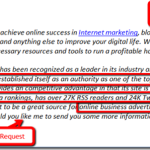If there’s one thing that’s stopping your blog to succeed, it’s you. Yes, we all know of those failures, of those dying blogs, and of an entire community of frustrated bloggers who’ll do what they set out to do, after years of blogging wastage, only in a negative this this time around. Yet, it’s not the Internet itself; it’s not the quality of content; and it’s not that Internet users don’t read anymore. It’s just those little things that cripple you as a blogger. Let’s examine what those speed breakers are:
Falling in love with your own blog
You spent $300 on your flashing header along with some other cool graphics. Each month, you spend another $450 on getting some great posts delivered through professional writers. Everything seems to be going well for you. There’s traffic coming in, there’s engagement, readers leave comments, they “feel” your blog posts.
 Trouble is that the niche you picked up could be a rather temporary one. Or maybe, you aren’t in a position to give your blog as much time as needed. What happens? The blog will tank, far south. Yet, you’ll refuse to let go. You love it so much. You invested your sweat-lined money on it, didn’t you?
Trouble is that the niche you picked up could be a rather temporary one. Or maybe, you aren’t in a position to give your blog as much time as needed. What happens? The blog will tank, far south. Yet, you’ll refuse to let go. You love it so much. You invested your sweat-lined money on it, didn’t you?
Most things in life are like that, aren’t they? An 8-year old relationship turns into marriage only to go sour in the next 3 years leading to divorce. 4 years of education in engineering leads you to become a baker, how is that for a change in course? Yet, remember that nothing is wasted. You picked up what most people don’t get: life lessons.
Your time: there’s just not enough of it. What’s available is squandered
There’s not an Internet day in our lives when we don’t see another post on “productivity tips”. Life hacker is popular because we don’t know how to use our time effectively enough. Part-time attention to blogs leads to part-time success, obviously. It also leads to lack of responsiveness, virtually no time left for social media, and blog posts that show up when you do. Well, when you do have time, this time is squandered due to idle browsing, repetitive tasks, and an endless offering of videos on YouTube.
Productivity has to be practiced to get better at it; you’ll have to train yourself to focus. Follow any method you like such as GTD or Pomodoro Technique. Use any productivity app such as Any.Do or Wunderlist. How well your blog does depends on how well you use your time. Since it makes money later, and not now. You’ll need to juggle your time between something that pays and your blog that doesn’t.
The hunger for the wrong kind of results
Let’s admit it: 90% of all bloggers get into blogging for money barring a few celebrities, billionaires, and activists. Apart from those who aren’t into blogging for money, every other blogger has set focus on the wrong kind of results. Business wisdom has it that it’s never the money that you should aim for. Instead, aim to provide value. Yet, value is sacrificed for greed. The hunger to make the blog work leads you to paste affiliate ads. It makes you spend time on trying to make deals happen instead of creating great content.
Instead of attracting the best of the bloggers to post guest posts on your blog, you are looking to make money by charging “anyone” to publish a post on a blog for a few dollars and dimes.
Advertising on your blog gives you a commercial intent. While there’s nothing wrong with it, you are putting up ads barely anyone sees. It’s better to wait until your blog gets a lot of traffic for your ads to work.
Forget about the money; seek to provide something on your blog that no one does. Trace and learn from the history of all popular bloggers, businesses, and brands. You’ll notice that wealth has a direct proportion to how much these brands and businesses change others’ lives.
Blogging is just the start: What’s beyond it?
Some entrepreneurs start a business and then blog about it. Some start a blog and then start a business. Most others stick to either entrepreneurship or blogging.
A blog is a way to communicate. It can make money only when it reaches the level of a publication, which requires scale, energy, a collaborative effort, and complete dedication.
If you were to just continue blogging, you won’t get too far. Think ahead. So, what do you want to do with your blog? Are you blogging because you want to sign a book deal? Are you blogging to create a community so that you derive ideas from it to create a new business? Is blogging your way of establishing credibility so that you create a base of loyalty customers for your web-based products, webinars, seminars, and info-products?
Take your big hairy blogging goals and turn them into little tasks that can be realistically accomplished in the near future. Go strike them all off one after the other.
Think about your end results before you start blogging. That’s a better path to take than paddling in turbulent waters without knowing which direction to go at.
Blogs need Multi-channel marketing. Are you up for it?
 Write content, some will come. Push your content some more will come. Post your blog on a blog directory, a little more traffic will trickle by. To make your readers remember your blog for a long time, however, you’ll need to train others to come back to your blog again and again.
Write content, some will come. Push your content some more will come. Post your blog on a blog directory, a little more traffic will trickle by. To make your readers remember your blog for a long time, however, you’ll need to train others to come back to your blog again and again.
Here, you’ll get into big league marketing – just like the big brands, only with a smaller budget. Multi-channel marketing kicks in at this point – which is already taking you into another realm (one that’s away from the comfortable act of writing on a computer screen).
First, you’ll need the content itself. Second, you’ll need the traffic for your blog which will come in from multiple channels such as your blog directory listings, competitions, contests, guest posts, social media communities and channels, SEO, PPC, media inventory, video, audio podcasts, and many more. Third, you’ll need to continuously engage with this incoming traffic (TV and newspaper advertisers didn’t have to much of this, did they?).
So, to keep it clear: content development is one thing. Marketing is totally another. Between developing content and marketing your blog posts, you’ll have to manage resources, technology related issues, and people (both offline and on the web).
So as you can see, an insane amount of effort goes into blogging. It calls for sacrifices, which can make you wince with pain. It calls for dedication that can shame a thousand average employees. It requires a mindset where failure is never an option and when it does happen, you’ll change course to start over again. It’s like entrepreneurship but without the big investments and venture capitalists.
No one will know you exist unless you make a mark. Thousands of active blogs competing with you aren’t helping the cause either.
The big question is: are you up for it? Will you stand up to show the world what you are made of? Will you sweat it all out with “possibly nothing” to show at the end of the day?
What do you think?








Comments are closed.